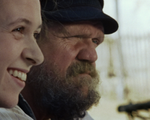Crimson staff writer
Harper R. Oreck
Latest Content
Damien Chazelle ’07 on His New Movie ‘Babylon’ and His Experience Studying Film at Harvard
The Harvard Crimson interviewed Damien Chazelle ahead of the release of “Babylon,” discussing his inspiration for the story as well as his experience studying film at Harvard.
Artist Profile: Dora Jar Brings Her Musical Dreamscapes to Boston
As she brought her propulsive, haunting indie-pop sound to audiences around the country on her first headlining tour this fall, Jar drew inspiration from the surreal beauty of Cirque du Soleil shows, with their synthesis of wild visuals, music, athleticism, and dance.
‘See How They Run' Review: A Stylish But Hollow Whodunit
While suspicion shifts to several different characters over the course of the film, their motives are rarely surprising, and the beats of the mystery feel flat as the finale nears. The film shines more in its humor than its suspense.
From Cannes: ‘Don Juan’ Fails to Seduce With Its Reimagination of the Classic Tale
The film becomes alienatingly hard to watch as it devolves into a bizarre musical about an unlikeable man terrorizing women on the street.
From Cannes: 'Three Thousand Years of Longing' Is 108 Minutes of Rollicking Entertainment Without A Clear Point
“Three Thousand Years” is one of the most highly-watchable films of the festival, sure to be a crowd-pleaser in theaters. But its palatability comes at a cost.
From Cannes: 'Crimes of the Future' Falls Flat With Boring Visuals and Shallow Themes
On the cinematic screen, where audiences can experience only the visual echoes of pain, Cronenberg orchestrates grotesque injuries and shocking transformations in the service of art.
From Cannes: 'Decision To Leave'’s High-Stakes Mystery Romance Is A Lighting Strike of Longing
Does the blood spilled behind two people bind them together or doom them to unhappiness? Can two people conditioned by violent obsessions ever turn away from them, or have they been indelibly shaped?
From Cannes: ‘War Pony’ Offers Engrossing, Vital Coming of Age Stories
The affecting drama is a triumph of communal filmmaking that highlights the perspectives of Native creatives, offering a fluid coming-of-age story that resists the narrative urge to insert artificial endings.
From Cannes: 'Triangle of Sadness' Enthralls and Eviscerates With Its Vision of Poisonous Wealth
Beyond its portrayal of wealth, the film’s more specific critique of exploitative beauty culture feels unique for the contemporary cinematic landscape.
From Cannes: “Hunt” Piles Twists Onto A Classic Spy-Movie Structure To Confusing Effect
The film offers an engaging portrait of the everyday dangers and bureaucratic infighting in an intelligence agency servicing the Korean military dictatorship, but eventually drags under the weight of its countless plot twists.
From Cannes: 'El Agua' Is Not The Supernatural Thriller You Might Expect — It’s Better
Where its premise might suggest a supernatural thriller, the film instead unravels as a vivid and emotive slice-of-life movie, beautifully tracking the blossoming romance between two teenagers.
From Cannes: 'Tirailleurs' Depicts France’s Exploitation of Senegalese Conscripts In Fast-Paced, Tragic World War I Story
Though Mathieu Vadepied makes a meaningful commentary about French abuse against colonial subjects in the name of the war effort, his latest film certainly has its issues.
From Cannes: Newcomer Julie Ledru Lights Up The Road In Electrifying Motocross Drama 'Rodeo'
The film is both a window into the pervasive misogyny endemic to the underground biking scene and a broader commentary on the way men are threatened by female independence.
From Cannes: ‘God’s Creatures' is a Quiet, Cutting Drama with a Resounding Message
The lie at the center of the film gives it a biting urgency, harnessing its intimate character portrait to speak to broader questions of loyalty, privilege, and the impact of collective complicity.
From Cannes: 'L’Envol' Delivers Rich Visuals And A Hollow Love Story
In the early moments of “L’Envol”, the new period drama from Italian director Pietro Marcello, the screen crackles to life with grainy, worn-out film footage of towns destroyed by World War I.



















